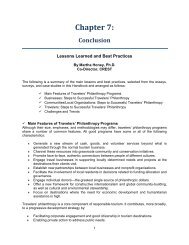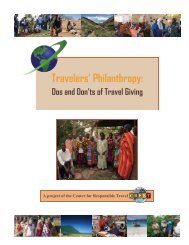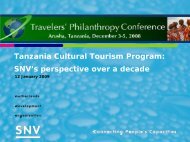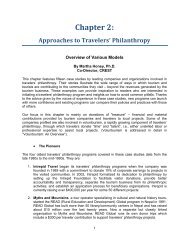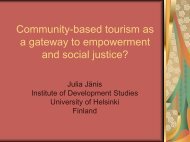Travelers' Philanthropy Handbook - Center for Responsible Travel
Travelers' Philanthropy Handbook - Center for Responsible Travel
Travelers' Philanthropy Handbook - Center for Responsible Travel
You also want an ePaper? Increase the reach of your titles
YUMPU automatically turns print PDFs into web optimized ePapers that Google loves.
2<strong>Travel</strong>ers’ <strong>Philanthropy</strong>: Dos and Don’ts of <strong>Travel</strong> Giving<strong>Travel</strong>ers’ desire to help, interact, and learn from those they meet during their holiday is clearly positive.However, there are sometimes unintended consequences from these good intentions. Misguidedcontributions can perpetuate cycles of dependency, cause corruption, burden communities withunwanted or inappropriate donations, and require recipients to spend timeand resources to handle ‘gifts’ they didn’t request or cannot use.As part of our <strong>Travel</strong>ers’ <strong>Philanthropy</strong> program, the <strong>Center</strong> <strong>for</strong> <strong>Responsible</strong><strong>Travel</strong> asked a dozen experienced tour operators and tourism organizationswho are engaged in supporting local community projects how they respond tosome of the most frequently asked questions and suggestions from travelersabout ‘giving’ while on holiday. Though they sometimes expressed differingviews, overall they agree that when, how, and what to contribute needs to bedecided by the host community, not the tourist or the tourism company.Below is a summary of their responses. It is intended to highlight some of thecomplexities behind donation and help build a more enlightened travelingpublic. It’s also intended to assist tourism businesses in crafting appropriateways to harness the goodwill and generosity of their guests while meetinggenuine needs in the host communities. A more in-depth summary of theresponses to this survey, as well as a condensed “bookmark” version isavailable online at: www.travelersphilanthropy.orgSchoolchildren inTibetan Children’s Village,Dharamsala, IndiaWhen visitors suggest:“I want to help build or finance a school/ a water well.”Experts respond:“It is important that guests who wish to make a contribution to local communities do not simply imposetheir own will on such communities. The community should be consulted and involved.”“Contributing to a significant initiative like this, where needed, could be great. But to ensure yoursupport is most effective and sustainable long term, we recommend that you contribute through anestablished non-government organization (NGO), which specializes in this area and has a history ofeffective results.”“Offering financial assistance towards a project is the most beneficialway of making a difference as a guest. Projects to be supportedthrough guest donations emerge from many hours of negotiation andconsultation [between the tourism company’s social developmentpractitioners and the community]. The project must be built on a basisof trust – a valuable and often unrecognized quality in achievingsuccess and positive, lasting impact. This encourages ‘partnership’and allows <strong>for</strong> ownership of the project to emerge. It removes thecritical risk of creating dependency on help coming from the outside.““Projects that are identified by guests disempower communities.Projects ‘given’ are not owned by communities. And the sustainabilityof the project will be compromised.”Fund a Water Well in Cambodiathrough GoPhilanthropic andJourneys within Our Community




